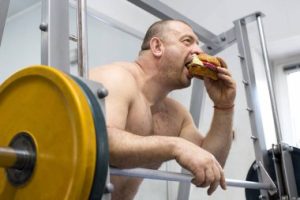
How Long After Exercise Can You Eat (6 Important Facts)
How long after exercise can you eat? Unlock the secrets to optimizing your post-workout nutrition and discover the perfect timing to refuel your body for maximum recovery and performance. After pushing your body to its limits in a vigorous workout, the question of when to refuel is crucial for optimizing recovery and performance. How long should you wait before diving into that post-exercise meal?
The timing can make a significant difference in how effectively your muscles repair, how energy stores are replenished, and how you feel for the rest of the day. Discovering the ideal window for eating after exercise is a blend of science and personal tuning that can transform your fitness journey. So, when is the best time to eat to make every workout count? Let’s delve into the science behind post-exercise nutrition timing.

How Long After Exercise Can You Eat
After exercising, it’s best to wait about 30 minutes to 2 hours before eating. This period allows your body to transition from a catabolic state to an anabolic state, optimizing nutrient absorption and muscle recovery.
The Ideal Time to Eat After a Workout
The ideal time to eat after a workout is within 30 minutes to two hours of completing your exercise. This window, often referred to as the “anabolic window,” is crucial for optimizing recovery, replenishing glycogen stores, and promoting muscle protein synthesis.
Consuming a balanced meal or snack that includes both protein and carbohydrates can enhance the repair and rebuilding of muscle tissues while restoring energy levels. Protein aids in muscle recovery and growth, while carbohydrates replenish the glycogen depleted during the workout. Eating promptly after exercise not only maximizes the benefits of your workout but also helps to prevent fatigue and support overall performance in subsequent sessions.
Physiological Processes Post-Exercise
Muscle Protein Breakdown and Synthesis
Anabolic and catabolic states
Post-exercise, the body undergoes several physiological processes that significantly impact muscle protein breakdown (MPB) and muscle protein synthesis (MPS). Initially, exercise induces a catabolic state characterized by increased MPB due to the mechanical and metabolic stress placed on muscle tissues. This breakdown releases amino acids, which are essential for subsequent repair and growth processes.
Concurrently, the body transitions into an anabolic state, wherein MPS is upregulated to rebuild and strengthen the damaged muscle fibers. The balance between these catabolic and anabolic processes determines the net muscle protein balance. Adequate protein intake plays a crucial role in optimizing this balance.
Role of protein intake
Consuming high-quality protein sources post-exercise provides the necessary amino acids, particularly leucine, which is a potent stimulator of MPS. This intake enhances the body’s ability to repair exercise-induced muscle damage, promote muscle hypertrophy, and adapt to the training stimulus. The timing, quantity, and quality of protein are critical; immediate post-exercise consumption, often within the first hour, is generally recommended to maximize MPS and mitigate MPB. Thus, strategic protein intake facilitates the body’s transition from a catabolic to an anabolic state, optimizing muscle recovery and growth in response to exercise.
Glycogen Depletion and Replenishment
Energy usage during exercise
During exercise, the body’s primary source of energy, glycogen, stored in the muscles and liver, undergoes substantial depletion, especially during prolonged or high-intensity activities. Glycogen, a polysaccharide of glucose, provides a readily accessible fuel to meet the increased energy demands of active muscles. As exercise continues, muscle glycogen stores diminish, leading to fatigue and decreased performance. The extent of glycogen depletion is influenced by the intensity and duration of the exercise, as well as the initial glycogen levels.
Importance of carbohydrates post-exercise
Post-exercise, the body prioritizes the replenishment of these glycogen stores to ensure a rapid recovery and preparedness for subsequent physical activities. This replenishment process is critically dependent on the intake of carbohydrates, which are broken down into glucose and transported to the muscles for glycogen synthesis. The post-exercise period, often referred to as the “glycogen window,” is an optimal time for carbohydrate consumption, as the muscles are more sensitive to insulin and more efficient at glucose uptake during this time.
Consuming carbohydrates immediately after exercise can significantly enhance the rate of glycogen resynthesis, facilitating faster recovery and improving performance in future workouts. Adequate carbohydrate intake post-exercise not only restores energy levels but also supports muscle repair and growth, as glucose is a key substrate for various metabolic processes. Therefore, understanding and implementing effective carbohydrate consumption strategies post-exercise are vital for athletes and individuals engaged in regular physical activity to maintain optimal performance and overall health.

Hormonal Responses
Insulin sensitivity
Post-exercise, the human body undergoes several physiological processes that significantly impact hormonal responses. One of the critical changes is an improvement in insulin sensitivity. Exercise stimulates the uptake of glucose into the muscle cells without the need for insulin, enhancing the muscles’ ability to store glycogen. This effect can last for hours to days after exercise, making it particularly beneficial for individuals with insulin resistance or type 2 diabetes. The increased insulin sensitivity facilitates better blood sugar control and reduces the risk of metabolic disorders.
Cortisol levels
Concurrently, cortisol levels, a stress hormone, also exhibit notable changes post-exercise. Cortisol is typically elevated during physical activity, as it helps to mobilize energy stores and manage inflammation. However, the extent of this increase can vary depending on the intensity and duration of the exercise. Post-exercise, cortisol levels gradually return to baseline, but the recovery process can take several hours.
Chronically elevated cortisol due to excessive training without adequate recovery can lead to negative health outcomes, such as impaired immune function and increased fat storage, particularly around the abdomen. Balancing exercise intensity and recovery is essential to harness these hormonal benefits while minimizing potential adverse effects.
Optimal Timing for Eating After Exercise
The Anabolic Window
The concept of the anabolic window refers to a specific period post-exercise, typically ranging from 30 minutes to two hours, during which the body is purported to be particularly receptive to nutrient intake, enhancing muscle repair and growth. This timeframe is believed to optimize the body’s ability to replenish glycogen stores, reduce muscle protein breakdown, and stimulate protein synthesis, thereby maximizing the benefits of a workout.
The anabolic window hypothesis has fueled the recommendation that consuming protein and carbohydrates soon after exercise can significantly boost recovery and muscle adaptation. However, debates within the scientific community challenge the rigidity of this window. Recent research suggests that while immediate post-exercise nutrition can be beneficial, the overall daily intake of nutrients, particularly protein, plays a more critical role in muscle recovery and growth than the precise timing.
Immediate Post-Exercise Nutrition (0-30 minutes)
Immediate post-exercise nutrition, specifically within the first 30 minutes following a workout, plays a crucial role in maximizing recovery and adaptation. During this period, often referred to as the “anabolic window,” the body’s ability to replenish glycogen stores and repair muscle tissue is significantly heightened.
Consuming carbohydrates during this time enhances glycogen resynthesis, the process by which glucose is stored in the liver and muscles for future energy use. This is particularly important after high-intensity or endurance exercises that deplete glycogen reserves. Additionally, ingesting protein shortly after exercise boosts muscle protein synthesis, the mechanism through which muscle fibers repair and grow, leading to improved strength and muscle mass over time.
To optimize these benefits, it is recommended to consume a combination of protein and carbohydrate sources immediately post-exercise. Protein sources such as whey protein, chicken breast, eggs, or plant-based options like tofu and legumes provide the essential amino acids necessary for muscle repair and growth.
Carbohydrate sources like fruits, whole grain bread, rice, or sports drinks rapidly replenish glycogen stores, ensuring that the muscles are ready for the next workout session. A balanced intake of approximately 20-30 grams of protein coupled with 40-60 grams of carbohydrates is often suggested to maximize the anabolic response. This strategic nutrient intake not only enhances recovery but also supports sustained energy levels and reduces muscle soreness, making it an essential aspect of any effective exercise regimen.

Short-Term Post-Exercise Nutrition (30 minutes to 2 hours)
Optimal timing for eating after exercise is crucial for maximizing recovery and enhancing muscle repair. Consuming nutrients within the short-term window, specifically 30 minutes to 2 hours post-exercise, offers significant benefits, including sustained recovery and continued muscle repair. During this period, the body is primed to absorb nutrients efficiently, replenishing glycogen stores and facilitating muscle protein synthesis.
A balanced post-exercise meal should ideally include a mix of carbohydrates and proteins. Carbohydrates help restore glycogen levels depleted during exercise, while proteins provide the necessary amino acids for repairing and building muscle tissue.
Examples of optimal post-workout snacks and meals include a turkey sandwich on whole grain bread, Greek yogurt with berries and honey, a smoothie made with protein powder, banana, and almond milk, or a quinoa salad with mixed vegetables and grilled chicken. These combinations ensure an adequate intake of essential nutrients, supporting both immediate recovery and long-term performance goals. Thus, timing and nutrient composition are key factors in post-exercise nutrition strategies, making it imperative to plan and consume well-balanced meals promptly after workouts.
Longer-Term Post-Exercise Nutrition (2 to 4 hours)
Optimal timing for eating after exercise plays a crucial role in ensuring effective recovery and enhancing future performance. Focusing on longer-term post-exercise nutrition, particularly within 2 to 4 hours after finishing a workout, offers significant benefits. One of the primary advantages of this timing is the continued replenishment of glycogen stores, which helps maintain energy levels for subsequent activities.
During this window, the body’s metabolic processes are still heightened, making it an opportune moment to absorb nutrients efficiently. This period is also critical for long-term recovery, as it supports muscle repair and growth, reducing the risk of injury and improving overall strength and endurance.
To maximize these benefits, it is recommended to consume meals that provide a balanced intake of macronutrients—carbohydrates, proteins, and fats. Carbohydrates are essential for restoring glycogen levels, proteins aid in muscle repair and synthesis, and healthy fats contribute to sustained energy and cellular function.
Additionally, hydration remains a key component of post-exercise nutrition. Replenishing fluids lost through sweat helps maintain optimal physiological functions and supports the transport of nutrients throughout the body. Hydrating with water, electrolytes, or beverages like coconut water can effectively restore fluid balance. By strategically consuming a balanced meal and staying hydrated within this 2 to 4-hour window, athletes and fitness enthusiasts can optimize their recovery process, enhance muscle adaptation, and prepare their bodies for future physical challenges.
Factors Influencing Post-Exercise Eating Timing
Type of Exercise
Post-exercise eating timing is influenced by several factors, including the type and intensity of exercise performed. Resistance training and endurance training create different physiological demands on the body, necessitating tailored nutritional strategies. Resistance training, which involves activities like weightlifting, leads to muscle breakdown and the need for protein synthesis for muscle repair and growth. Consuming protein-rich foods shortly after such workouts is essential to maximize muscle protein synthesis and recovery.
On the other hand, endurance training, such as running or cycling, primarily depletes glycogen stores in the muscles and liver. Therefore, the focus post-exercise should be on replenishing these glycogen stores through carbohydrate intake, ideally within a 30-minute to two-hour window to optimize glycogen resynthesis. Additionally, the intensity of the workout also plays a crucial role.
High-intensity exercises, whether resistance or endurance, create greater metabolic disturbances and muscle microtrauma, thus necessitating quicker and more substantial nutritional intervention to facilitate recovery and adaptation. This often involves a combination of carbohydrates and proteins to replenish energy stores and support muscle repair.
Conversely, low-intensity exercises might not demand such immediate or specific nutritional intake, as the body’s recovery needs are less acute. For low-intensity sessions, the timing of the next meal can be more flexible, focusing more on overall daily nutrient intake rather than immediate post-exercise consumption. Therefore, understanding the type and intensity of exercise is crucial for optimizing post-exercise nutrition to enhance recovery, performance, and overall training adaptations.
Individual Goals
The timing of post-exercise eating is a crucial factor influenced by individual fitness goals, whether they are focused on muscle gain, fat loss, or performance enhancement. For those aiming to gain muscle, consuming protein and carbohydrates shortly after a workout is essential for optimizing muscle protein synthesis and replenishing glycogen stores. This anabolic window, typically considered to be within 30 minutes to two hours post-exercise, helps in repairing and building muscle fibers that are stressed during resistance training.
Conversely, individuals focused on fat loss might prioritize delaying post-exercise eating slightly to extend the period of elevated fat oxidation that occurs after exercise. However, they still need to ensure they consume a balanced meal eventually to support recovery and maintain muscle mass.
For performance enhancement, athletes need to carefully time their nutrient intake to ensure quick recovery and prepare for subsequent training sessions. Carbohydrates play a significant role in restoring glycogen levels, while proteins help repair muscle damage, thus a combination of these nutrients shortly after exercise can enhance recovery and performance in future workouts.

Individual Differences
The timing of post-exercise eating is influenced by several factors, with individual differences playing a significant role. One of the primary factors is metabolism, which varies greatly from person to person. Those with a faster metabolism might feel the need to eat shortly after exercising to replenish energy stores and support muscle recovery, while those with a slower metabolism may not experience hunger as quickly.
Additionally, an individual’s schedule and lifestyle can dictate when they are able to eat after a workout. For instance, someone with a demanding job or family commitments might not have the flexibility to eat immediately after exercising, potentially delaying their post-exercise meal. Furthermore, pre-exercise nutrition also impacts post-exercise eating timing. If an individual consumes a substantial meal or snack before working out, their hunger cues post-exercise might be delayed compared to someone who exercised on an empty stomach or with a light snack.
The type and intensity of exercise performed can also affect how soon one feels hungry afterward, with more intense or prolonged workouts generally leading to a quicker onset of hunger. Personal preferences and habits, such as the desire to eat a balanced meal versus a quick snack, can also influence the timing and nature of post-exercise nutrition. Overall, the interplay of metabolism, lifestyle constraints, and pre-exercise nutrition underscores the importance of a personalized approach to post-exercise eating, recognizing that what works for one individual may not be suitable for another.
Practical Guidelines for Post-Exercise Nutrition
General Recommendations
Post-exercise nutrition plays a crucial role in the recovery and overall performance of athletes and fitness enthusiasts alike. General recommendations for optimal recovery include a balanced intake of protein, carbohydrates, and fluids. Consuming 20-30 grams of protein shortly after exercise is essential to stimulate muscle protein synthesis and repair damaged muscle tissues. This protein can come from various sources, such as lean meats, dairy, eggs, or plant-based options like beans and legumes, depending on dietary preferences.
Alongside protein, carbohydrates are vital for replenishing glycogen stores that get depleted during intense physical activity. It is recommended to consume 1-1.2 grams of carbohydrates per kilogram of body weight within the first hour post-exercise. This can be achieved through whole grains, fruits, vegetables, or sports drinks tailored for rapid glycogen replenishment.
Additionally, rehydration is a critical component of post-exercise recovery. Effective hydration strategies involve consuming fluids that contain electrolytes, such as sodium and potassium, to replace those lost through sweat. The exact amount of fluid intake can vary based on the intensity and duration of the exercise, as well as individual sweat rates, but a general guideline is to drink enough to restore the body to its pre-exercise weight. Combining these elements—adequate protein, appropriate carbohydrates, and sufficient hydration—ensures that the body can recover efficiently, reducing the risk of injury and enhancing future performance.
Specific Scenarios
Post-exercise nutrition is crucial for recovery, muscle synthesis, and replenishment of glycogen stores. Tailoring nutrition to specific scenarios optimizes these benefits. For morning workouts, it is essential to refuel with a balanced breakfast that combines carbohydrates, proteins, and healthy fats. Options like whole-grain toast with avocado and eggs, oatmeal topped with nuts and berries, or a yogurt parfait with granola and fruits are ideal. Smoothies can be a quick and effective alternative, blending ingredients like spinach, banana, protein powder, and almond milk for a nutrient-packed meal on the go.
Evening workouts necessitate a slightly different approach; a balanced dinner that includes lean proteins such as chicken or tofu, complex carbohydrates like quinoa or sweet potatoes, and plenty of vegetables ensures a comprehensive nutrient intake. Light snacks before bed, such as a small bowl of cottage cheese with pineapple or a handful of almonds with a piece of fruit, can help sustain muscle repair overnight without disrupting sleep.
Competitive athletes, who have higher caloric and nutrient demands, should focus on high-calorie meals that combine multiple food groups to support intense training regimens. This might include dishes like salmon with brown rice and a large mixed salad, or a beef stir-fry with various vegetables and noodles.
Supplements and recovery shakes can play a pivotal role for these athletes, providing an immediate source of protein and carbohydrates post-exercise. Options like whey protein shakes with added creatine, or recovery drinks fortified with branched-chain amino acids (BCAAs) and electrolytes, help accelerate recovery and enhance performance. By adhering to these practical guidelines, individuals can ensure they are meeting their specific nutritional needs based on their workout schedules and goals.
Myths and Misconceptions
The Myth of the Anabolic Window
The “anabolic window” is a popular fitness myth that claims there is a narrow post-workout timeframe—often suggested to be about 30 minutes—during which consuming protein and carbohydrates will significantly enhance muscle repair and growth. However, recent research has debunked the necessity of such strict timing. Studies have shown that the body’s ability to utilize nutrients for muscle repair and growth extends well beyond this narrow window. Instead of adhering to a rigid schedule, athletes and fitness enthusiasts can adopt more flexible eating strategies without compromising their progress.
For instance, the total daily intake of protein and calories is far more critical for muscle hypertrophy and recovery than the precise timing of consumption. As long as individuals meet their nutritional needs throughout the day, the specific timing of meals becomes less significant. This shift towards a more flexible approach allows for greater convenience and less stress, enabling people to integrate their nutrition plans more seamlessly into their daily lives.
It also reduces the risk of overemphasizing immediate post-workout nutrition, which can lead to unnecessary supplementation and potentially poor dietary choices. Ultimately, understanding that muscle recovery and growth are influenced by overall nutritional habits rather than a strict post-workout window can help individuals optimize their fitness outcomes in a more sustainable and enjoyable manner.
Carbohydrate Fear
Carbohydrate fear is a widespread myth and misconception that has led many people to view all carbs as detrimental to health and weight management. This fear often stems from popular diet trends and misinformation that paint carbohydrates as the primary culprits of weight gain and poor health. However, carbohydrates play a crucial role in our diet, particularly in the context of recovery and overall balance of macronutrients.
Carbohydrates are the body’s primary source of energy, especially important for fueling physical activities and replenishing glycogen stores in muscles post-exercise. When carbs are consumed after exercise, they help accelerate recovery, repair muscles, and prepare the body for subsequent workouts. Neglecting carbohydrates can hinder this recovery process, leading to prolonged fatigue and decreased performance.
Additionally, balancing macronutrients—proteins, fats, and carbohydrates—is essential for optimal health. Each macronutrient has a unique role: proteins are vital for muscle repair and growth, fats are necessary for hormone production and nutrient absorption, and carbohydrates provide quick and efficient energy. A well-balanced diet that includes all three macronutrients in appropriate proportions supports metabolic health, enhances physical performance, and maintains overall wellbeing.
Instead of fearing carbohydrates, individuals should focus on choosing nutrient-dense, whole-food sources of carbs such as fruits, vegetables, whole grains, and legumes, which provide essential vitamins, minerals, and fiber. By understanding the importance of carbohydrates in recovery and macronutrient balance, we can dispel the myths and misconceptions surrounding this vital nutrient and promote a more informed and holistic approach to nutrition.
Overemphasis on Supplements
Myths and misconceptions about supplements abound, particularly regarding their perceived superiority over whole foods. A prevalent myth is that supplements can fully substitute a balanced diet of whole foods, providing all necessary nutrients in an equally effective or even superior manner. This misconception overlooks the complexity and synergistic nature of nutrients in whole foods, which often contain a variety of vitamins, minerals, fiber, and phytochemicals working together in ways that supplements cannot replicate.
Whole foods offer a holistic approach to nutrition that supports overall health, including aspects like improved digestion and absorption of nutrients, which isolated supplements cannot match. Moreover, the overemphasis on supplements can lead to neglecting a varied and balanced diet, potentially resulting in nutrient imbalances and deficiencies that supplements alone cannot correct. While supplements can play a valuable role, especially for individuals with specific deficiencies or increased nutritional needs—such as pregnant women, elderly people, or those with certain medical conditions—their effective use is complementary to, not a replacement for, a nutrient-rich diet.
It’s essential to approach supplementation with the understanding that it should fill gaps rather than act as the primary source of nutrition. The efficacy and safety of supplements also depend on their proper use, including appropriate dosages and avoiding unnecessary or excessive intake, which can cause adverse effects and interact with medications. Therefore, fostering a comprehensive understanding of the limitations and appropriate use of supplements, alongside an emphasis on the fundamental role of whole foods, is crucial for optimal health and well-being.
FAQs: How Long After Exercise Can You Eat
Q1. Why is the timing of eating after exercise important?
A. The timing of your post-exercise meal can significantly impact recovery and performance. Eating soon after exercising helps replenish glycogen stores, repair muscle tissue, and rehydrate your body.
Q2. How soon should I eat after working out?
A. It’s generally recommended to eat within 30 minutes to 2 hours after exercising. This window is optimal for nutrient absorption and muscle recovery.
Q3. What should I eat after a workout?
A. A balanced post-workout meal should include carbohydrates to replenish glycogen stores and protein to aid in muscle repair. Examples include a smoothie with fruits and protein powder, a turkey sandwich on whole-grain bread, or Greek yogurt with berries.
Q4. Can I eat immediately after exercising?
A. Yes, you can eat immediately after exercising. In fact, consuming a snack or meal within 30 minutes post-exercise can be particularly beneficial for recovery.
Q5. What if I don’t feel hungry after exercising?
A. If you’re not hungry right after a workout, consider a small snack or liquid nutrition, like a protein shake or smoothie. These can be easier to consume and still provide essential nutrients.
Q6. Does the type of exercise affect when I should eat?
A. The intensity and duration of your workout can influence your nutritional needs. After high-intensity or long-duration workouts, it’s especially important to eat within the recommended time frame to optimize recovery.
Q7. Can eating too late after exercise impact recovery?
A. Yes, delaying your post-workout meal beyond the 2-hour mark can slow down recovery. Your body is most efficient at using nutrients for repair and replenishment immediately after exercise.
Q8. Should I avoid any foods right after exercising?
A. It’s best to avoid foods high in fats and fiber immediately after a workout, as they can slow down digestion. Focus on easily digestible carbohydrates and lean proteins.
Q9. Is it necessary to eat after a light workout?
A. Even after a light workout, consuming a small amount of protein and carbohydrates can help your muscles recover and prepare for the next exercise session.
Q10. Can I just drink a recovery drink instead of eating a meal?
A. Recovery drinks can be a convenient option, especially if they contain a good balance of carbohydrates and protein. However, whole foods can provide additional nutrients that are beneficial for overall health.
Q11. What are the best post-workout foods for vegetarians?
A. Vegetarians can benefit from foods like quinoa, lentils, chickpeas, tofu, and a variety of fruits and vegetables. Pair these with plant-based protein sources like protein powders made from peas, rice, or hemp.
Q12. Is there a difference in post-workout nutrition needs between men and women?
A. While basic principles remain the same, individual nutritional needs can vary based on factors like body weight, muscle mass, and hormonal differences. Both men and women should focus on balanced intake but might need to adjust quantities according to their specific needs.
Q13. Should I consider supplements for post-workout recovery?
A. Supplements such as protein powders, BCAAs (branched-chain amino acids), and electrolyte drinks can be beneficial, especially if you find it challenging to meet your nutritional needs through food alone. Always consider consulting a nutritionist or healthcare provider before starting any supplement.
Conclusion
In conclusion, the optimal timing for eating after exercise depends on the type of workout and individual goals. Generally, consuming a balanced meal or snack within 30 minutes to two hours post-exercise can enhance recovery, replenish glycogen stores, and support muscle repair. This window is crucial for those engaging in high-intensity or endurance training, as the body’s ability to absorb nutrients and rebuild is heightened during this period. However, for moderate exercisers, the timing is more flexible, allowing for adjustments based on personal convenience and preference. Ultimately, listening to your body and ensuring adequate nutrient intake are key to maximizing the benefits of your exercise routine.